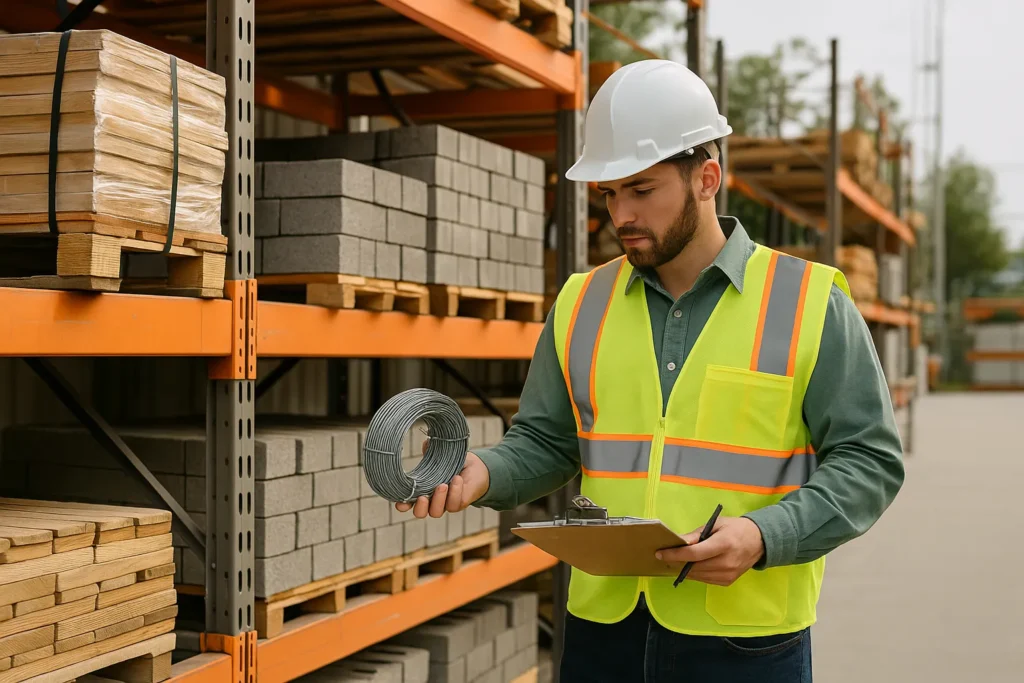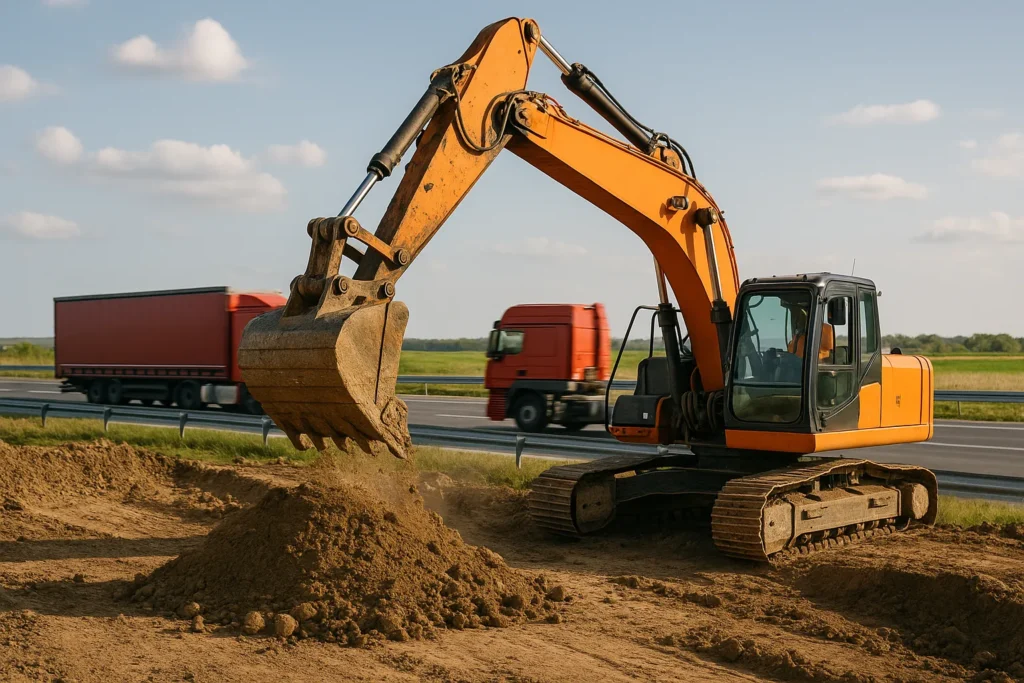
Have you ever had your excavator break down right when you needed it most? We’ve seen contractors lose thousands because one simple part took weeks to arrive.
That’s why you need a reliable parts supplier that gets you replacement parts before you start losing money. Some suppliers promise fast delivery but leave you waiting. Others send cheap parts that break after a month, forcing you to pay twice for the same repair.
This guide will show you how to choose the best parts supplier that keeps your equipment running. We’ll cover inventory checks, customer service evaluation, and backup plans for when things go wrong.
At Bites Off Broadway, we’ve been helping construction firms for over three decades by providing quality excavator parts and undercarriage components.
We’ll help you learn what questions to ask and what red flags to watch for. Let’s get started.
Why Your Construction Supply Chain Determines Project Success
A reliable construction supply chain keeps your projects on schedule and within budget. Without it, costly delays will wipe out your profit margins and damage client relationships.
From our experience working with construction firms across Australia, we’ve seen supply chain problems increase project costs by 30% to 40% in many cases. Think about your last big project and how many times you waited for parts.
Those delays add up fast when you’re paying crews to stand around while explaining setbacks to frustrated clients (and trust us, angry clients remember delays when it’s time to renew contracts).

Supply chain disruptions hit your wallet in ways you might not expect:
- Labour costs pile up: Your crew still needs to be paid while waiting for parts
- Client penalties kick in: Missing deadlines often means penalty fees
- Equipment sits idle: Expensive machinery generates no revenue when broken
- Emergency shipping costs: Rush orders cost 2-3 times more than standard delivery
What we’ve noticed over the past few years is that supply chain challenges have hit some contractors harder than others. The contractors who got hammered the worst were working with suppliers who disappeared when problems hit. But the smart ones who had solid relationships with trustworthy parts suppliers? They kept working while their competitors sat idle.
Beyond these observations, we’ve watched contractors completely transform their operations by switching suppliers. One client told us he went from losing $50K on delayed projects to finishing jobs early after finding a reliable parts supply. That means a good supplier can literally save your next project.
How to Check if Your Best Parts Supplier Has Quality Aftermarket Parts
Quality aftermarket parts should meet or exceed OEM specifications (the same standards set by the original equipment manufacturer) while costing much less than original parts. Not all aftermarket parts are created equal, though, and quality varies widely between manufacturers (we’ve seen parts that looked identical but one lasted 6 months while the other lasted 6 years).
The difference between good and poor aftermarket parts comes down to three main factors: the manufacturing process, quality control systems, and certification standards.
Most contractors ask us, “Do you have quality parts?” Every supplier will say yes to that. Instead, ask these specific questions to reveal their real standards:
- What certifications do they hold? Look for ISO 9001 certification, which shows they follow strict quality management systems. This certification requires regular third-party audits and continuous improvement processes. Suppliers without proper certifications often cut corners on quality control (and you’ll find out the hard way when parts fail prematurely).
- Do they test parts before shipping? Quality suppliers perform inspections on every part that leaves their warehouse. They should tell you exactly what tests they run and show you their testing equipment. We recommend avoiding suppliers who just trust their sources without verification.
- Where are parts manufactured? Reputable suppliers work directly with certified manufacturers and know the exact facilities where parts are made. You need to be cautious of suppliers who get vague about their manufacturing sources (that’s usually a red flag for cheap imports).
- What’s their return policy? Confident suppliers offer generous return policies because they trust their products. Most importantly, look for suppliers who accept returns even if the part works but doesn’t meet your expectations. Restrictive return policies often hide quality concerns.
- Can they provide documentation? Good suppliers keep detailed records of part origins, quality testing results, and compliance certificates. They should provide batch numbers, manufacturing dates, and test reports when requested. On the other hand, suppliers who get defensive about documentation usually have something to hide.
At Bites Off Broadway, we’ve built our reputation by being transparent about our quality processes. When contractors ask us about extending equipment life through proper maintenance, we always emphasise that quality parts are just as important as regular service.
Questions to Ask About Your Supplier’s Operations
Now that you know how to check part quality, let’s talk operations. You can have the highest quality parts in the world, but if your supplier can’t get them to you when needed, you’re still stuck with broken equipment and angry clients.
We’ve broken this down into three areas that make or break supplier relationships: inventory management, delivery reliability, and customer service. Let’s walk through what really matters for each one.
Inventory and Stock Management
Your supplier’s inventory system makes the difference between getting parts fast and waiting weeks for restocking. We’ve seen contractors lose entire jobs because their supplier ran out of common parts (like hydraulic seals that should always be in stock).
Ask these questions about their stock management:
- How do they track inventory levels? Modern suppliers use real-time systems that show exact stock levels. You shouldn’t have to wait while they say “check with the warehouse” every time you call. That’s usually code for “we don’t actually know what we have”.
- What’s their stock rotation policy? Good suppliers rotate stock, so you’re getting fresh parts, not components that have been sitting on shelves for years. Old parts deteriorate in storage, especially rubber seals and hydraulic components that lose flexibility over time.
- Do they have multiple warehouse locations? Suppliers with regional warehouses ship faster and provide backup stock when one location runs out. This becomes especially important during busy construction seasons when everyone needs the same parts.
Delivery Speed and Reliability
When your excavator breaks down, every hour of downtime costs you money. You’re paying crews who can’t work, explaining delays to unhappy clients, and watching your project timeline slip away.

This is where professional suppliers are needed. They understand your urgency and take emergency orders seriously.
When evaluating delivery capabilities, focus on three main areas that separate reliable suppliers from the rest.
Shipping Options You Can Count On
Reliable suppliers offer clear shipping timeframes without the runaround. They don’t just have one speed but provide same-day, next-day, and standard options with honest delivery estimates. Also, emergency repairs shouldn’t require jumping through hoops or paying ridiculous surcharges just to get parts when you need them.
Emergency Orders Done Right
The best suppliers have dedicated systems for urgent deliveries that work. When they say “ships in 2 hours,” they mean it, not “we’ll try our best.” They can prioritise your emergency orders because they understand that your downtime costs real money.
Communication Before Problems Hit
Watch out for suppliers who only communicate after delays happen. Professional suppliers call you before problems occur and offer solutions like expedited shipping at their expense.
They take ownership instead of making excuses about shipping companies (we’ve all heard that one before). This proactive approach separates the professionals from suppliers who treat your emergency like routine paperwork.
Customer Service and Communication
Strong customer service means getting help when problems arise, whether you’re placing orders or dealing with issues after delivery. Poor communication leads to receiving the wrong parts, delayed shipments, and project managers ready to quit.
Customer service quality shows up in three main areas that directly affect your experience with any supplier.
Account Management and Support
Quality suppliers assign dedicated account managers or have customer service teams that know your order history. This means you shouldn’t have to explain your business from scratch every time you need help. The best suppliers keep track of your equipment types, past orders, and specific requirements so every conversation builds on what they already know about your operation.
Response Time and Accessibility
Professional suppliers respond to emails within hours and answer phones with real people, not endless automated menus. They understand that parts inquiries are usually urgent situations that need immediate attention.
So, you should avoid suppliers who take days to return calls (that tells you everything about their priorities) or force you to work through multiple departments just to find someone who can help.
Technical Knowledge and Problem Solving
Good suppliers have knowledgeable staff who help identify the right parts for your specific equipment. Beyond just taking orders, they should cross-reference part numbers and suggest alternatives when exact matches aren’t available.
We suggest looking for technical support teams that can troubleshoot compatibility issues and recommend solutions for recurring equipment problems.
Planning for When Things Go Wrong: Backup Plans That Work
Once you’ve found a supplier who passes the operational tests, let’s talk about the stuff nobody wants to think about until disaster strikes. Equipment breakdowns, supply shortages, and shipping delays are part of construction life. These problems will happen, so be ready when they do.
Every contractor needs backup suppliers they can call when their main supplier runs out of parts. To build this network, find 2-3 reliable alternatives and test them with small orders during your slow season. This way, you’ll know their quality and delivery speed before you’re dealing with broken equipment and frustrated crews (nothing worse than finding your backup supplier is incapable of handling an actual emergency).

You also need written plans for common problems like receiving the wrong parts or your supplier being out of stock. When creating these plans, write down which backup suppliers to call first and who has authority to approve emergency shipping costs.
Then keep some emergency inventory focused on parts that break often and items that take weeks to get from manufacturers.
Pro Tip: Track which parts you’ve needed most over the past year. That’s your emergency stock list right there.
Building a Long-Term Partnership with Your Reliable Excavator Parts Supplier
Choosing the right parts supplier comes down to quality, reliable operations, and backup plans. Ask the right questions about certifications and testing, build relationships with backup suppliers, and keep smart emergency inventory.
Good supplier relationships work both ways. Pay on time, communicate clearly, and treat reliable suppliers like partners. Suppliers remember contractors who respect them and will prioritise your orders when you need parts fast.
That’s the kind of partnership we build at Bites Off Broadway. We help contractors get quality excavator parts with the reliable service you deserve.
